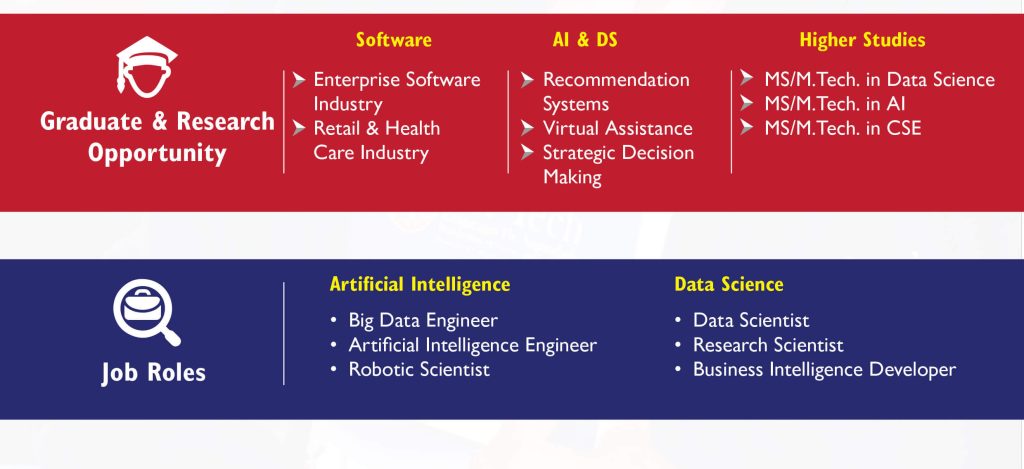- [email protected]
- TN: +91 94455 68802 |
- AP & TS: 90031 07000 |
- Other States: 74488 88954|
- Toll Free: 1800 2127 669
About | Academic Regulations | Quality Assurance | Alumni | AICTE | NAAC |NIRF
About | Academic Regulations | Quality Assurance | Alumni | AICTE | NAAC |NIRF
Data Science is an interdisciplinary field with the ability to extract knowledge/insights from data – be it structured, unstructured, or semi-structured data. Twinned with Artificial Intelligence, more efficient solutions to find meaningful information from huge pools of data are possible today, with data from multiple sources-sensors, images, streaming video, satellite, medical imagery and the cloud.
HoD – Artificial Intelligence (AI) and Data Science

After completion of degree graduate will
PEO1: Apply the fundamental skills to acquire, curate, manage, analyze and make inferences from data.
PEO2: Formulate and solve real world problems using cutting edge technologies in Artificial Intelligence and Data Science.
PEO3: Explore opportunities in the growing field of Artificial Intelligence and Data Science as trained professionals or pursue higher education at a reputed institution in India or abroad.
PEO4: Exhibit professional leadership skills to excel as committed engineers with high ethical values in interdisciplinary domains and engage in lifelong learning.
Engineering Graduates will be able to:
PO1. Engineering knowledge: Apply the knowledge of mathematics, science, engineering fundamentals, and an engineering specialization to the solution of complex engineering problems.
PO2. Problem analysis: Identify, formulate, review research literature, and analyze complex engineering problems reaching substantiated conclusions using first principles of mathematics, natural sciences, and engineering sciences.
PO3. Design/development of solutions: Design solutions for complex engineering problems and design system components or processes that meet the specified needs with appropriate consideration for the public health and safety, and the cultural, societal and environmental considerations.
PO4. Conduct investigations of complex problems: Use research-based knowledge and research methods including design of experiments, analysis and interpretation of data, and synthesis of the information to provide valid conclusions.
PO5. Modern tool usage: Create, select, and apply appropriate techniques, resources, and modern engineering and IT tools including prediction and modeling to complex engineering activities with an understanding of the limitations.
PO6. The engineer and society: Apply reasoning informed by the contextual knowledge to assess societal, health, safety, legal and cultural issues and the consequent responsibilities relevant to the professional engineering practice.
PO7. Environment and sustainability: Understand the impact of the professional engineering solutions in societal and environmental contexts, and demonstrate the knowledge of, and need for sustainable development.
PO8. Ethics: Apply ethical principles and commit to professional ethics and responsibilities and norms of the engineering practice.
PO9. Individual and team work: Function effectively as an individual, and as a member or leader in diverse teams, and in multidisciplinary settings.
PO10. Communication: Communicate effectively on complex engineering activities with the engineering community and with society at large, such as, being able to comprehend and write effective reports and design documentation, make effective presentations, and give and receive clear instructions.
PO11. Project management and finance: Demonstrate knowledge and understanding of the engineering and management principles and apply these to one’s own work, as a member and leader in a team, to manage projects and in multidisciplinary environments.
PO12. Life-long learning: Recognize the need for, and have the preparation and ability to engage in independent and life-long learning in the broadest context of technological change.
On successful completion of the program, the graduates will be able to,
PSO1: Extract knowledge from the data using Artificial Intelligence and Data Science principles
PSO2: Develop essential proficiency in the areas related to Data Science and Artificial Intelligence in terms of underlying statistical and computational principles to solve real world problems.